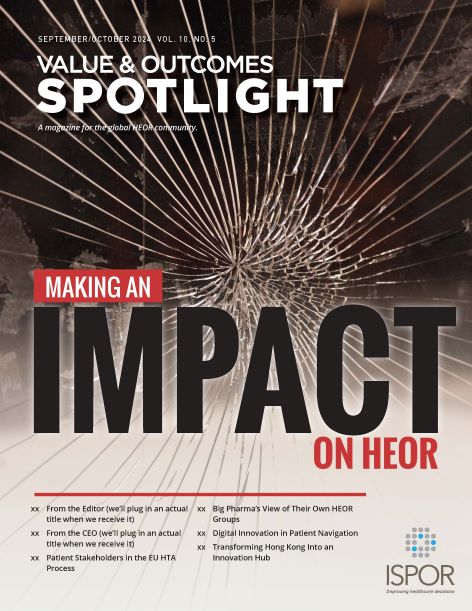The Transformative Impact of HEOR
 Health economics and outcomes research
(HEOR) is a rapidly evolving field that has become increasingly relevant in
today’s complex healthcare landscape. The discipline’s primary goal is to
inform healthcare decision making by providing scientifically rigorous and
sound data on health economics and outcomes. The impact of HEOR is
far-reaching, influencing healthcare stakeholders, addressing challenges, and
informing issues using data and research approaches.
Health economics and outcomes research
(HEOR) is a rapidly evolving field that has become increasingly relevant in
today’s complex healthcare landscape. The discipline’s primary goal is to
inform healthcare decision making by providing scientifically rigorous and
sound data on health economics and outcomes. The impact of HEOR is
far-reaching, influencing healthcare stakeholders, addressing challenges, and
informing issues using data and research approaches.
ISPOR has been at the forefront of
this evolution, making significant strides in the application of HEOR to
transform healthcare. Former ISPOR president, Jan Elias Hansen, PhD (2022 –
2023), highlighted the Society’s achievements in her term, emphasizing the role
of HEOR in engaging healthcare stakeholders, addressing pain points, and
proactively informing healthcare issues.
One of the key impacts of HEOR is its
role in informing regulatory approval with real-world evidence (RWE). For
instance, noninterventional real-world data studies and registries have been
used to inform regulatory approvals in various therapeutic areas such as
oncology, neuroscience, and infectious diseases. This impact has been
particularly evident in the United States, where RWE has been instrumental in
providing access to innovative drugs.
HEOR has also made significant strides in other parts of the world. In Argentina, real-world data were used in developing and implementing a performance-based risk-sharing agreement for patients with HR+ and HER2- advanced or metastatic breast cancer. This work has had a profound impact on patients’ access to novel treatments.
"ISPOR has been at the forefront of this evolution, making significant strides in the application of HEOR to transform healthcare."
ISPOR’s influence is also evident in
the development of national guidelines in countries like India, New Zealand,
and Thailand. ISPOR chapters in these countries have been contributing
expertise and directly engaging in the development of national guidelines for
health technology assessment, pricing, reimbursement, and economic evaluations.
However, the impact of HEOR is not
just limited to policy making and regulatory approvals. It also plays a crucial
role in shaping the conversation about the value of healthcare. As pointed out
in the feature article, HEOR scientists need to become better communicators
about what they do, how they do it, and why non-HEOR experts should care.
One of the ways to achieve our goals
is by making the impact of HEOR more concrete. For instance, Jalpa Doshi, PhD,
and her team used rigorous HEOR and policy methods to propose policy solutions
to fix Medicare Part D cost-sharing policy to enhance access to specialty drug
treatments. Their work highlighted the financial burdens on patients and
proposed solutions like an annual out-of-pocket cap combined with monthly
payment caps (smoothing). This research influenced policy changes in the
Inflation Reduction Act of 2022, set to take effect in 2025 and is a testament
to the power of HEOR in shaping healthcare policy and improving patient
outcomes.
Emphasizing the need for HEOR scientists to improve their communication skills is also critical. Darius Lakdawalla, PhD, from USC Schaeffer Center discusses the importance of explaining the value of medical innovations in concrete terms that resonate with the public. He highlights the need to frame HEOR findings in terms of human values like life expectancy and health outcomes. Dr Lakdawalla’s work on Medicare coverage for obesity treatments and the economic impact of drug-pricing measures exemplifies the need for clear and relatable communication. Additionally, Jens Grueger, PhD, from Boston Consulting Group stresses the importance of using simple language and broader perspectives in communication. He also suggests training young HEOR professionals in effective communication to ensure their research influences health policy and public understanding.
ISPOR Student Chapters are having a significant impact on the growth of the HEOR profession and its relevance around the globe, as evidenced by their activities and achievements. For example, in 2023, the ISPOR Student Chapter based at King Saud University in Saudi Arabia organized a visit to the Saudi Food and Drug Administration’s Pricing Department, where 30 students gained practical insights into the regulatory aspects of the pharmaceutical industry. In India, the ISPOR Manipal University Student Chapter organized the ISPOR India Student Chapter Conference in February 2024, which provided a platform for ISPOR thought leaders, innovators, and professionals from around the country and region to come together to share their insights and discuss the topic, “Patient Engagement in Healthcare: Asian Perspective.” These are just a few examples of the powerful impact ISPOR student chapters are having globally.
"ISPOR Student Chapters are having a significant impact on the growth of the HEOR profession and its relevance around the globe, as evidenced by their activities and achievements."
In conclusion, the impact of HEOR is transformative and far-reaching. It is not just about generating evidence or informing policy decisions; it is about making a real difference in the lives of patients. As we move forward, it is crucial that we continue to leverage the power of HEOR to transform healthcare, improve patient outcomes, and ensure equitable access to high-value treatments. The work of ISPOR and its members serves as a beacon, guiding us toward a future where healthcare decision making is informed, evidence-based, and patient-centered.
We would love to highlight your
stories in a future issue of Value & Outcomes Spotlight. I invite
you to share your HEOR story of impact via this submission
link.
As always, I welcome input from our readers. Please feel free to email me at zeba.m.khan@hotmail.com.
Zeba M.
Khan, RPh, PhD, Editor-in-Chief, Value & Outcomes Spotlight

